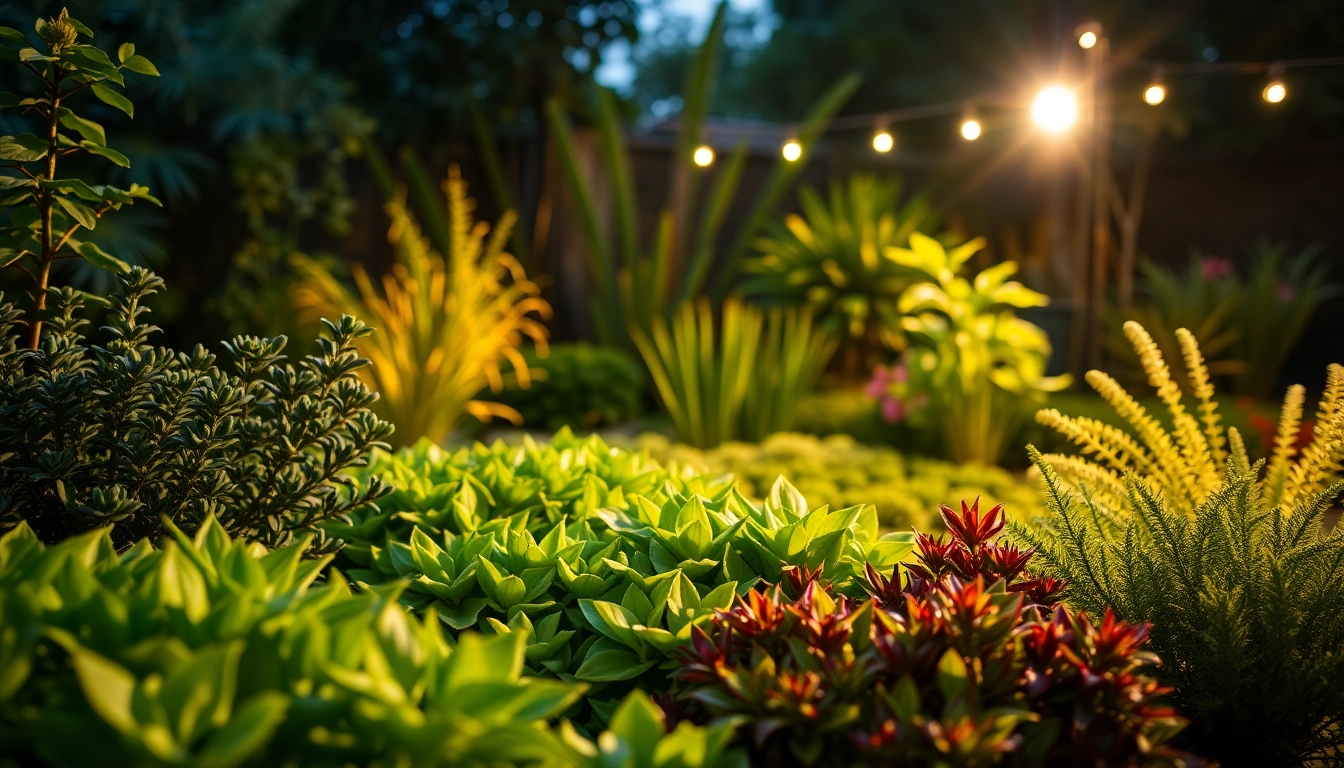
Understanding Garden Maintenance Services
What Does a Garden Maintenance Service Include?
Garden maintenance services encompass a wide range of activities designed to keep your outdoor space healthy, vibrant, and beautiful. Typically, these services include regular lawn care, weeding, pruning, planting, mulching, and pest management. Depending on the provider, additional services such as seasonal clean-ups, soil testing, landscape design, and irrigation system installation may also be offered. By employing a professional garden maintenance service, homeowners can ensure that their gardens receive the attention they need throughout the year.
Benefits of Professional Garden Maintenance
Engaging a professional garden maintenance service comes with numerous benefits that can greatly enhance the overall quality of your outdoor space. Here are some key advantages:
- Expertise: Professionals bring extensive knowledge and experience to the table, allowing them to assess plants’ health, identify pests, and recommend solutions effectively.
- Time-Saving: Maintaining a garden can be time-consuming. Hiring experts frees up time for homeowners to focus on other priorities.
- Bespoke Solutions: A professional service can tailor maintenance plans to meet individual garden needs, considering specific plant types, local climate, and soil conditions.
- Enhanced Aesthetics: Regular care often leads to a healthier garden, enhancing the beauty and value of your property.
- Stress Reduction: Knowing your garden is in expert hands can alleviate the stress of upkeep and allow you to enjoy your outdoor space fully.
Choosing the Right Garden Maintenance Service
When it comes to selecting a garden maintenance service, it is important to consider several factors to ensure you choose the right fit for your needs:
- Reputation: Research reviews and testimonials from previous clients to gauge the provider’s reliability and quality of service.
- Service Range: Ensure the service is comprehensive, covering all aspects of garden maintenance necessary for your garden’s health.
- Certification: Check for certifications or affiliations with gardening organizations that demonstrate professionalism and knowledge.
- Cost Transparency: Opt for a service that provides clear pricing structures with no hidden fees, ensuring you get excellent value for your investment.
- Personal Connection: A good rapport with the maintenance team can make a significant difference in the quality of service and communication.
Essential Tools for Garden Maintenance
Recommended Equipment for Garden Care
A well-maintained garden requires the right tools to facilitate various maintenance tasks efficiently. Below is a list of essential gardening tools that every gardener should have:
- Hand Tools: These include hand trowels, weeders, and pruning shears for tasks that require precision.
- Lawn Tools: Lawn mowers, string trimmers, and edgers are crucial for maintaining a tidy lawn.
- Soil Tools: Rakes, shovels, and hoes are necessary for soil preparation and maintenance.
- Irrigation Equipment: Hoses, sprinklers, and drip irrigation systems help ensure plants receive adequate water.
- Safety Gear: Gloves, knee pads, and goggles protect you while working in the garden.
Eco-Friendly Tools to Minimize Impact
In today’s eco-conscious world, it’s important to consider the environmental impact of your gardening tools. Here are some eco-friendly options to consider:
- Hand Tools: Opt for hand-driven tools instead of power tools to reduce energy consumption.
- Composters: Composting it’s a great way to recycle plant waste and enrich garden soil naturally.
- Rain Barrels: Collecting and storing rainwater for irrigation promotes sustainable watering practices.
- Biodynamic Tools: These are made from sustainable materials that reduce carbon footprints and environmental pollution.
How to Maintain Your Tools for Longevity
To get the most out of your garden tools, proper maintenance is crucial. Here are some tips for extending their lifespan:
- Cleaning: Always clean your tools after use to remove soil, plant residue, and rust.
- Sharpening: Keep blades sharp by regularly sharpening them to facilitate clean cuts and easy use.
- Storage: Store your tools in a dry, protected location to prevent rust and degradation.
- Lubrication: Oil moving parts to ensure they work smoothly and prevent rust.
Common Challenges in Garden Maintenance
Weather-Related Obstacles
Weather can have a significant impact on garden maintenance and growth. Factors such as drought, excessive rain, and temperature fluctuations can create challenges:
- Drought: In dry conditions, it’s crucial to implement efficient watering practices and mulching to retain soil moisture.
- Heavy Rain: Excessive rainfall can lead to soil erosion and waterlogging, so consider planting in well-draining soil and employing raised beds.
- Frost: Use row covers or move potted plants indoors during unexpected cold snaps to protect sensitive plants.
Pest Control: Common Issues and Solutions
Pests can pose a significant threat to garden health. Knowing how to identify and control them can save your plants:
- Aphids: These small insects can deplete plant nutrients. Use insecticidal soap or introduce beneficial insects like ladybugs to combat them.
- Slugs and Snails: These creatures can cause extensive damage. Set out bait or traps and encourage natural predators like birds.
- Spider Mites: Small but destructive, these pests often thrive in dry conditions. Regularly misting plants can prevent infestations.
Time Management for Effective Garden Care
Effective garden maintenance requires a strategic approach to time management:
- Set a Schedule: Allocate specific days for mowing, weeding, and other maintenance tasks to create a routine.
- Prioritize Tasks: Identify urgent tasks versus those that can wait based on weather and plant needs.
- Involve Family or Friends: Garden maintenance can be more enjoyable and efficient when shared with others.
Best Practices for Effective Garden Maintenance
Creating a Seasonal Maintenance Schedule
A seasonal maintenance schedule acts as a roadmap for maintaining your garden year-round. Here is a sample framework:
- Spring: Focus on cleaning up winter debris, planting early crops, and fertilizing soil.
- Summer: Implement watering routines, control weeds and pests, and provide shade when necessary.
- Fall: Prepare the garden for winter by mulching, planting perennials, and cleaning tools.
- Winter: Protect vulnerable plants, organize tools, and plan for spring gardening activities.
Soil Health: Testing and Improving Quality
Healthy soil is essential for thriving plants. Regular soil testing can provide insights into nutrient levels and pH balance:
- Conduct Soil Tests: Use at-home kits or send samples to a lab to analyze soil quality and determine necessary amendments.
- Organic Matter: Add compost or other organic materials to improve soil structure and nutrient content.
- Crop Rotation: Rotate plant types yearly to maintain soil health and reduce pest and disease buildup.
Watering Techniques for Optimal Growth
Water is vital to any garden. Applying the right watering techniques will greatly impact plant health:
- Deep Watering: Water deeply and infrequently to encourage strong root growth.
- Morning Watering: Watering in the morning reduces evaporation and allows plants to absorb moisture before the heat of the day.
- Drip Irrigation: Consider installing a drip irrigation system for targeted watering, which conserves water and reduces runoff.
Measuring Success in Garden Maintenance
Key Performance Indicators for a Thriving Garden
Assessing the health of your garden involves measuring several performance indicators:
- Plant Health: Monitor plant growth rates, color, and resilience to pests or diseases.
- Yield: For vegetable gardens, track the quantity and quality of produce harvested over time.
- Weed Growth: The prevalence of weeds can indicate the effectiveness of your garden maintenance practices.
Regular Assessments: When and How to Evaluate
Conduct regular assessments to ensure you are meeting your garden’s needs:
- Monthly Check-Ins: Schedule monthly checks to evaluate plant health, soil conditions, and overall garden appearance.
- Seasonal Reviews: At the end of each season, review what worked well and what needs adjustment for the next season.
- Documentation: Keep a garden journal to document observations, changes, and results over time for continuous improvement.
Adapting Your Strategy for Improved Results
Adaptation is key to successful garden maintenance. As you gather data and feedback, implement changes:
- Be Flexible: Understand that gardening involves trial and error. Adjust strategies based on weather patterns, plant performance, and pest activity.
- Stay Informed: Educate yourself on current gardening trends and techniques through books, workshops, and online resources.
- Engage with the Community: Join gardening clubs or online forums to gain insights from experienced gardeners and share your own experiences.







